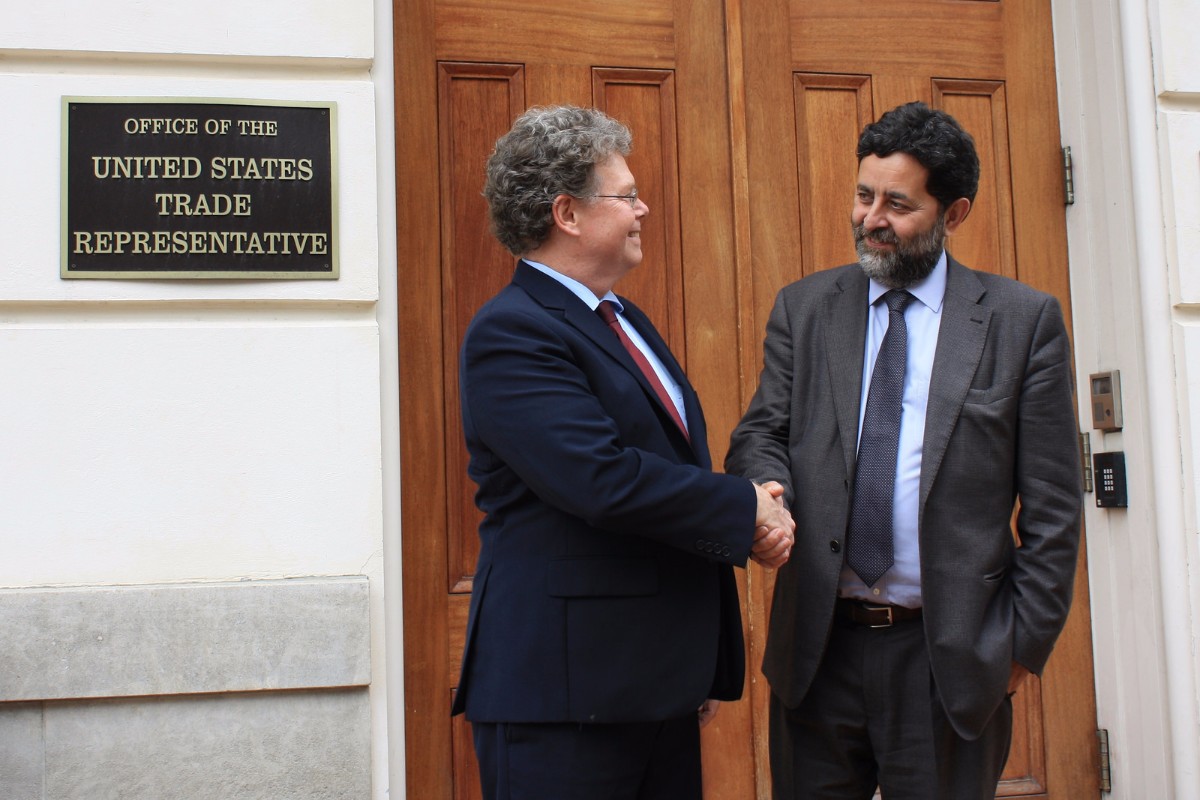 USTR Photo
USTR Photo
Free Trade Agreement Roundup
The United States is currently in the process of negotiating two major, multilateral free trade agreements. The two sets of negotiations include the US and 39 other countries – 11 around the Pacific Rim in one agreement and the 28 members of the European Union in the other. Though it will be many months until the completed treaties are up for congressional approval, negotiators in each case are close to reaching a final deal.
TPP
 The last round of negotiations for the Trans-Pacific Partnership (TPP) is scheduled for this week. Representatives from each of the 12 nations included in the deal are meeting in Hawaii to resolve the last remaining issues before the final agreement can be submitted for approval.
The last round of negotiations for the Trans-Pacific Partnership (TPP) is scheduled for this week. Representatives from each of the 12 nations included in the deal are meeting in Hawaii to resolve the last remaining issues before the final agreement can be submitted for approval.
Negotiators are divided over terms related to prescription medications, with the US Trade Representative insisting on a provision requiring patents on drugs to be recognized for 12 years. Australian and New Zealander delegates have expressed concern that this would increase the cost of medications for their citizens and want to allow for earlier production of generic alternatives, but the US considers it a key aspect of the agreement.
On another front, domestic political pressure from the agriculture sector may keep Canadian negotiators from making a final agreement. The Canadian government is unwilling to remove popular tariffs that support the domestic dairy industry with an election looming, but dairy and other agricultural products make up a large portion of New Zealand’s exports. The issue is but one example of the complicated process of negotiating a multilateral trade agreement. Other contentious issues yet to be settled include: Vietnamese labor practices; general intellectual property rights; and the independent arbitration process of Investor-State Dispute Settlement (ISDS), which is a process that allows foreign investors to lodge complaints against what they perceive as unfair practices by host nations.
Despite these concerns, TPP negotiations could be completed soon – even if congressional approval will have to wait. As a condition of Trade Promotion Authority, a final agreement must wait more than four months before Congress can begin consideration. All but the most optimistic forecasts suggest that a final vote will not be held until sometime next year.
 TTIP
TTIP
The Transatlantic Trade and Investment Partnership (TTIP) will not be concluded this year, according to European Union Trade Commissioner Cecilia Malmstroem. In an interview with German newspaper Der Tagesspiegel, Malmstroem explained that while the end of 2015 may be an overly ambitious timetable, negotiations could be finalized before President Barack Obama leaves office. Nevertheless, negotiating rounds have already been scheduled for October and December 2015, and a November session may be added to the calendar.
TTIP faces some of the same issues complicating TPP. Representatives from Greece and other European nations are worried that the deal will not address their concerns about the protection of product names like “feta” and “gorgonzola,” claiming that products famous for certain origins deserve similar treatment to foods named after specific regions. This silly-seeming dispute does have some serious implications, as US companies could lose income of more than a billion dollars if products have to be renamed, and Greek feta exports alone are worth €260 million annually.
ISDS is another divisive issue. Malmstroem mentioned a European plan to establish an alternative mechanism for resolving disputes between states and foreign investors, but the US has been a staunch supporter of ISDS arbitration. This process will be a major item for this year’s remaining negotiation rounds, as will government procurement and the above-mentioned agricultural issues.
Though final designation will have to wait until the agreement is final, Malmstroem explained that TTIP will likely be ruled a “mixed” agreement, requiring the approval of both the European Parliament and the parliaments of every EU member. Despite what will almost certainly be a difficult period of negotiations and final approval, Malmstroem said that she believes a “silent majority” of Europeans support the deal and will eventually see it completed.
While complicated, successful negotiations and ratification of TPP and TTIP are in America’s competitiveness and economic diplomacy – and therefore national security – interest. Free trade will open up more markets for American products and provide cheaper goods to American consumers. Both of these agreements present the US with the opportunity to use economic diplomacy to strengthen our overall relationship with important trading partners and strategic allies in the European Union and along the Pacific Rim.





